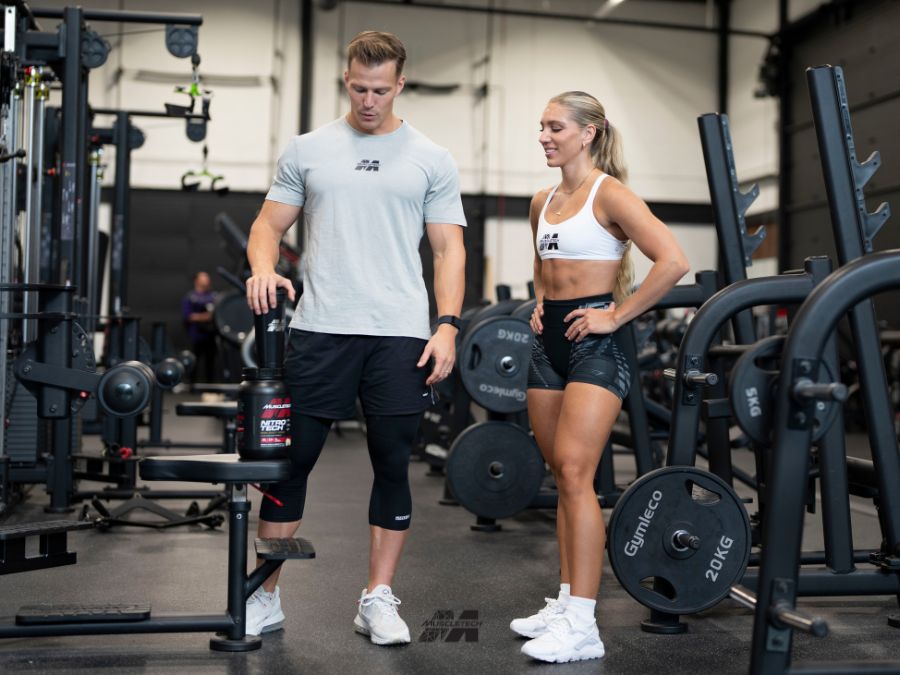Beginning a weight gain journey for every athlete demands an individualized and informed approach. As certified sports nutritionists and strength coaches, we have helped hundreds of clients build and cut weight with individualized nutrition protocols.
Over our time helping clients, we have realized that too often, there is a fixation on weight loss. However, it is important to note that gaining weight can be just as healthy as trying to shed pounds. It can also be just what is required to bulk up for a sport or maintain an https://www.hydroxycut.com/blogs/articles/lose-weight.
This article will dive into the top supplements for women to gain weight correctly. We will also review the significance of a balanced approach, how to determine your daily calories, and dispel common myths about weight gain that can derail your progress.
Table of content
The Top Weight Gain Supplements For Women
Nitro-Tech Whey Protein
MuscleTech NitroTech Protein powder is a powerful protein supplement that enhances muscle growth and recovery by providing high-level whey protein and peptides. Whey protein is ideal for post-workout recovery due to its rapid digestion and absorption by the body.
Each serving of Nitro-Tech provides 30 grams of whey protein and an entire sequence of essential amino acids to prime your muscles for muscle growth. (1) Including quality protein in your diet is critical for a woman to gain weight as protein provides the building blocks for recovery and muscle growth and ample calories to create a caloric surplus. (1)
100% Mass Gainer
The 100% Mass Gainer by MuscleTech packs a powerful punch for weight gain for women. In most cases, athletes will struggle to put on size and strength because they lack the necessary calories to cover their essential metabolic function and training and then have calories left over to support growth.
By incorporating a supplement such as the 100% Mass Gainer, you can easily cover your basis and put yourself in a great position to gain weight. The supplement provides a whopping 60g of protein per serving and 1,500 calories in each serving, setting the stage post-workout for great caloric intake for the rest of the day.
The 100% Mass Gainer also contains 5g of creatine, which will assist in helping to put on size and strength due to its effect on training intensity, and 305g of complex carbohydrate blend. The combination of protein, carbohydrates, and creatine is all you need to start packing on size in combination with your training. (2)
Mass-Tech Extreme 2000
If you want to guarantee that you gain the weight you want as a woman, the MassTech Extreme 2000 supplement is for you. MassTech Extreme 2000 provides an incredible 2,130 calories, only 6g of fat, 460g of carbs, and 60 grams of protein. It is one of the most calorically dense mass gainers today.
With over 2000 calories per serving, you can easily add a day's worth of eating with a single serving.
In addition to its macronutrient profile, it provides 13.3g of BCAAs, including 6.4g of L-leucine and 5g of creatine monohydrate. Combining the macronutrients, muscle-building BCAAs, and ample creatine monohydrate per serving will ensure you hit your goal weight.
If you need to gain weight fast or struggle to gain weight, Mass-Tech Extreme 2000 is for you.
Creatine Monohydrate
By now, you will have noticed that almost all of the top weight gain supplements for women mentioned contain creatine monohydrate. That is because it is powerful for packing on size and strength.
By replenishing the body's primary energy source, adenosine triphosphate (ATP), creatine allows you to train with higher intensities and larger volumes daily. (3) This leads to a heightened training stimulus and, ultimately, more muscle growth. (3)
MuscleTech Platinum 100% Creatine provides 5g of pure creatine monohydrate in each serving to ensure your creatine stores become fully saturated and you are prepared to train hard. It’s also available in pill and flavored chewable formats.

Plant Protein
If you prefer not to consume animal products or do not tolerate milk protein well, look no further than MuscleTech Plant Protein. This protein powder provides 25g of high-quality plant protein per serving.
It is developed through a blend of faba bean, pea protein, mung bean, brown rice, and pumpkin seed. Providing a diverse mix of plant proteins to assist you in recovering from training.
After training, the supplement provides 9g of Essential Amino Acids (EAAs) for muscle support that are not synthesized within the body and must be consumed in the diet. (1)
It also contains 250mg of OPTIZIOME™ P3 HYDROLYZER™, a scientifically studied enzyme matrix to enhance protein digestion. Its 250mg of Nordic Cherry, a tart cherry extract rich in phytonutrients, assists in preventing muscle tissue breakdown.
Importance of a Balanced Approach To Weight Gain
Contrary to what many believe, gaining weight does not have to be, nor should it involve simply consuming as much food as humanly possible without regard for nutrient density or a balanced macronutrient profile.
A meticulous approach is warranted to ensure the body receives all the nutrients it requires for optimal weight gain without unnecessary fat gain. This involves individualized nutrition prescriptions and training protocols.
For example, it would be counterintuitive to load up on carbs and fat to provide a caloric surplus and not pay attention to the main muscle-building macronutrient: protein. (2) Likewise, if the goal is to gain weight, then hypertrophy-based training is required in your routine to signal the body to grow new lean tissue.
Common Weight-Gaining Myths For Women
There are many myths when it comes to weight gain for women. For example, it is commonly believed that gaining weight will result in an excessive increase in body fat. Although some weight gained could likely be adipose tissue, with an individualized approach, adequate training, and ample protein intake, this can be mitigated as much as possible.
For example, setting calories to no more than a 15% surplus from maintenance calories is ideal. A 15% increase will provide just enough of a surplus to gain weight but not so much where excessive additional body fat is accrued. (4)
Another common myth is that in a world where being lean and "toned," focusing on weight gain for a woman should be avoided. This could not be further from the truth as there are many reasons a woman would want to gain weight.
First and foremost, women should achieve a healthy body weight for their body type and function. Several bodily functions in women can be disrupted in the presence of hyper restricted calories and low weight, such as the female athlete triad characterized by inadequate caloric intake due to dysfunctional eating, menstrual dysfunction, and low bone mineral density. (5)
The second is weight gain related to sports performance. In many sports, it benefits athletes to be bigger, stronger, and faster than opponents. If you, as a female athlete, find that you're being "outmuscled" by your competitors, it may be time to move up a weight class to increase your likelihood of winning.
Understanding The Basics of Weight Gain
Here's a step-by-step guide to help you navigate this process:
Please note that this is for educational purposes only. There are many ways to determine a nutritional prescription, and your specific needs and health history may warrant a different and individualized approach. Please consult a healthcare professional before putting anything you read here into practice.
1. Set Your Caloric Goals
The first step to effectively gaining weight for women is to determine your daily caloric needs. You can do this by finding your basal metabolic rate and multiplying it by an activity factor to determine your total daily energy expenditure (TDEE).
Your TDEE will be the amount of calories you will need to maintain your weight. You will add ~15% to your TDEE to set calories to gain weight.
2. Break Down Macronutrient Ratios
Next, set your macronutrient percentages to ensure the balanced approach mentioned earlier. There are many ways to do this, but I will typically set protein at 1.4-2.0 grams per kilogram of body weight. If you are unsure how to convert pounds to kilograms, simply divide your weight by 2.2.
Next, determine your fat intake based on your activity level. If you are less active throughout the day, it may be a good idea to have a higher percentage of fat in your diet as you won't use as many carbohydrates.
If you are more active, choose less fats, but you will likely fall somewhere between 20-35% of calories coming from fat. To find the grams of fat, simply divide by 9, as there are 9 calories in one gram of fat. (6)
Lastly, you will "fill" the rest of the remaining calories with carbohydrates by taking the remaining calories and dividing them by 4, as there are 4 calories in one gram of carbohydrate. (6)
3. Determine Meal Frequency
Lastly, divide your calories and macronutrients by how many meals you will have daily. If you get full quickly, opt for more frequent meals. If you are short on time to eat, pick larger meals. In general, I don't recommend that someone eat below two meals per day so that protein synthesis can be stimulated multiple times throughout the day.
Consider incorporating snacks throughout the day or build in your post-workout shake. How you achieve your calories and macronutrients is up to you as long as you are reaching your targets and seeing progress.
Final Thoughts On Weight Gain Supplements For Women
For women, gaining weight can be a challenging task. There are many myths about weight gain for women, and you may become discouraged by those who oppose the concept of purposely trying to gain weight.
But it is essential to understand that your goals are your own, and gaining weight may be just what you need to live a healthy and high-performing life. If you feel that you are ready to embark on a weight-gaining journey, then get serious about your diet, pick up the supplements that you need, and get organized.
The top supplements I have curated for you by Muscle-Tech are some of the highest quality on the market today, and you won't be disappointed if you try them.
Now, let's get to work!
References:
- Jäger, R., Kerksick, C. M., Campbell, B. I., Cribb, P. J., Wells, S. D., Skwiat, T. M., Purpura, M., Ziegenfuss, T. N., Ferrando, A. A., Arent, S. M., Smith-Ryan, A. E., Stout, J. R., Arciero, P. J., Ormsbee, M. J., Taylor, L. W., Wilborn, C. D., Kalman, D. S., Kreider, R. B., Willoughby, D. S., Hoffman, J. R., … Antonio, J. (2017). International Society of Sports Nutrition Position Stand: protein and exercise. Journal of the International Society of Sports Nutrition, 14, 20. https://doi.org/10.1186/s12970-017-0177-8
- West, D. W. D., Abou Sawan, S., Mazzulla, M., Williamson, E., & Moore, D. R. (2017). Whey Protein Supplementation Enhances Whole Body Protein Metabolism and Performance Recovery after Resistance Exercise: A Double-Blind Crossover Study. Nutrients, 9(7), 735. https://doi.org/10.3390/nu9070735
- Burke, D. G., Silver, S., Holt, L. E., Smith Palmer, T., Culligan, C. J., & Chilibeck, P. D. (2000). The effect of continuous low dose creatine supplementation on force, power, and total work. International journal of sport nutrition and exercise metabolism, 10(3), 235–244. https://doi.org/10.1123/ijsnem.10.3.235
- Larson-Meyer, D. E., Krason, R. K., & Meyer, L. M. (2022). Weight Gain Recommendations for Athletes and Military Personnel: a Critical Review of the Evidence. Current nutrition reports, 11(2), 225–239. https://doi.org/10.1007/s13668-022-00395-3
- Javed, A., Tebben, P. J., Fischer, P. R., & Lteif, A. N. (2013). Female athlete triad and its components: toward improved screening and management. Mayo Clinic proceedings, 88(9), 996–1009. https://doi.org/10.1016/j.mayocp.2013.07.001
- Fenton, T. R., & Elmrayed, S. (2021). The Importance of Reporting Energy Values of Human Milk as Metabolizable Energy. Frontiers in nutrition, 8, 655026. https://doi.org/10.3389/fnut.2021.655026








